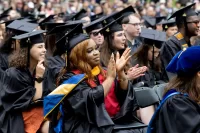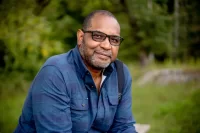
Philanthropic, scientific, literary leaders to address Commencement
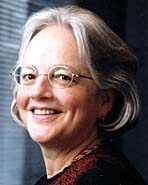 |
Above, Susan Berresford. Below: Phillip Sharp, Warren Washington, Pauline Yu |
A philanthropic leader, a molecular biologist, a climate researcher and a literary scholar will receive honorary degrees and speak at Bates College’s 142nd commencement ceremony at 10 a.m. Sunday, May 25, on the college’s historic Quad, at Campus Avenue and College Street.
The event concludes the undergraduate careers of some 440 members of the Bates’ class of 2008, representing 37 states and 29 countries.
The 2008 Bates honorands are:
• former Ford Foundation President Susan Berresford, who has dedicated her philanthropic career to the fulfillment of human potential;
• Phillip Sharp, a scientist whose RNA research holds great promise for cancer therapeutics;
• Warren Washington, a pioneer in computerized climate modeling and an authority on climate change;
• and Pauline Yu, a literary scholar who is expert in the languages and cultures of East Asia.
Berresford will receive the Doctor of Humane Letters degree.
As Ford Foundation president from 1996 to 2007, she directed billions of grant dollars worldwide to strengthen democracy, reduce poverty and injustice, promote international cooperation and advance human achievement. The common imperative was to serve human potential.
“Philanthropy should support people who have very high ambitions, people who believe in better opportunities and a better life for all people,” she recently told Philanthropy News Digest. Early in her Ford Foundation career, which began in 1970, Berresford encouraged foundation grants to civil rights and gender-focused programs. Without that serious support, the feminist movement might have been treated “as a fad,” said journalist and women’s advocate Gloria Steinem at a tribute event in 2007.
As Ford president, Berresford streamlined the bureaucracy to make the foundation more responsive. “She wove together the idea of a domestic and international foundation and created a truly global program,” said Lorie Slutsky, president of The New York Community Trust, in 2007.
In 2000, the foundation made a landmark $280 million grant, its largest ever, to establish the Ford Foundation International Fellows program, providing graduate scholarships for students from the world’s poorest communities. The foundation, whose $12 billion in assets supports annual grants exceeding $500 million, also expanded its work on HIV/AIDS, invested in higher education in Africa, created major arts programs and facilitated affordable mortgages for low-income families.
Berresford, who graduated cum laude from Radcliffe College, chairs the grant-making organization United States Artists and is a member of the European Foundation Centre’s Governing Council. Currently she consults on philanthropy for The New York Community Trust and leads projects for the Ford Foundation, including the U.S.-Vietnam Dialogue Group on Agent Orange/Dioxin.
Accepting the 2007 John W. Gardner Leadership Award from the Independent Sector, a professional association for grant-making organizations, Berresford urged philanthropic leaders to “aim high. Let us not leave people behind.”
Sharp will receive a Doctor of Science degree. A world leader of research in molecular biology and biochemistry, this Nobel laureate is an institute 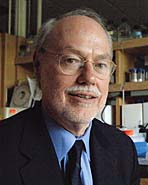 professor at the Massachusetts Institute of Technology. Sharp has conducted much of his scientific work at the MIT Center for Cancer Research, which he joined in 1974 and directed from 1985 to 1991. He led the Department of Biology from 1991 to 1999 before becoming founding director of the McGovern Institute, a position he held from 2000 to 2004.
professor at the Massachusetts Institute of Technology. Sharp has conducted much of his scientific work at the MIT Center for Cancer Research, which he joined in 1974 and directed from 1985 to 1991. He led the Department of Biology from 1991 to 1999 before becoming founding director of the McGovern Institute, a position he held from 2000 to 2004.
Sharp’s research has centered on the molecular biology of gene expression relevant to cancer and the mechanisms of RNA splicing. His landmark work, in 1977, provided one of the first indications of “discontinuous genes” in mammalian cells, a discovery that fundamentally changed scientists’ understanding of gene structure and earned Sharp the 1993 Nobel Prize in Physiology or Medicine.
His lab now investigates the role that RNA molecules play in switching genes on and off, a function called RNA interference (RNAi). These newly discovered processes have revolutionized cell biology and could potentially generate a new class of therapeutics.
Sharp has authored more than 360 papers. He has received numerous awards and honorary degrees, and has served on many advisory boards for the government, academic institutions, scientific societies and private industry. He is an elected member of the National Academy of Sciences, the Institute of Medicine, the American Academy of Arts and Sciences and the American Philosophical Society.
A native of Kentucky, Sharp earned a bachelor’s degree from Union College in 1966 and a Ph.D. in chemistry from the University of Illinois at Urbana-Champaign in 1969. He did postdoctoral training at the California Institute of Technology, where he studied the molecular biology of plasmids from bacteria in professor Norman Davidson’s laboratory. Prior to joining MIT, he was senior scientist at Cold Spring Harbor Laboratory.
Sharp was a co-founder of Biogen (now Biogen Idec) and Alnylam Pharmaceuticals, a company that is developing RNAi-based therapeutics. He serves on the boards of both companies.
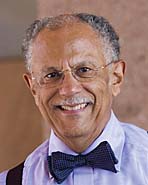 Washington too will receive a Doctor of Science degree. Senior scientist and head of the Climate Change Research Section at the National Center for Atmospheric Research (NCAR), he has advised five U.S. presidents on climate change. Washington was one of the first developers of computer models for predicting atmospheric and climatic conditions.
Washington too will receive a Doctor of Science degree. Senior scientist and head of the Climate Change Research Section at the National Center for Atmospheric Research (NCAR), he has advised five U.S. presidents on climate change. Washington was one of the first developers of computer models for predicting atmospheric and climatic conditions.
From 1974 to 1984, Washington served on the president’s National Advisory Committee on Oceans and Atmosphere. In May of 1995, he was appointed to the National Science Board, which helps oversee the National Science Foundation and advises the White House and Congress on science-related matters.
Washington participated in several panels of the National Research Council and chaired its advisory group for “Climate Puzzle,” a film produced for the 1986 PBS television series “Planet Earth.” He was a member of the U.S. secretary of energy’s advisory board from 1990 to 1993 and has served on the secretary of energy’s Biological and Environmental Research Advisory Committee since 1990.
Washington has more than 120 publications to his credit and is co-author with Claire Parkinson of a textbook that has become a standard reference: “An Introduction to Three-Dimensional Climate Modeling.” In later years, Washington has worked with other scientists to incorporate ocean and sea ice physics into climate models. Such models now involve atmospheric, ocean, sea ice, surface hydrology and vegetation components.
Born in Portland, Ore., Washington earned a bachelor’s degree in physics and a master’s degree in meteorology from Oregon State University. He joined NCAR in 1963 as a research scientist after completing a doctorate in meteorology at The Pennsylvania State University. His group at NCAR shared in the 2007 Nobel Peace Prize as significant contributors to the Intergovernmental Panel on Climate Change.
Yu will receive the degree of Doctor of Letters. A distinguished literary scholar 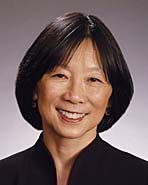 and a dedicated guardian of academic reflection, innovation and research, she has championed the life of the mind.
and a dedicated guardian of academic reflection, innovation and research, she has championed the life of the mind.
She has been president since 2003 of the American Council of Learned Societies, which supports research in the humanities and social sciences through individual fellowships, conference grants and international scholarly exchange.
Yu served as dean of humanities in the College of Letters and Science at the University of California, Los Angeles, and as professor of East Asian languages and cultures from 1994 to 2003. Founding chair of the Department of East Asian Languages and Literatures at the University of California, Irvine (1989-1994), she also served on the faculty of Columbia University (1985-89) and the University of Minnesota (1976-85).
Yu received a bachelor’s degree magna cum laude in history and literature from Harvard University and a master’s and Ph.D. in comparative literature from Stanford University.
She is the author or editor of five books and dozens of articles on classical Chinese poetry, comparative literature and issues in the humanities, and has received fellowships from the Guggenheim Foundation, the ACLS and the National Endowment for the Humanities. Yu received the 2007 William Riley Parker Prize for best article to appear in PMLA, the Modern Language Association’s journal of literary scholarship.
A fellow of the American Academy of Arts and Sciences and the American Philosophical Society, she is an elected member of the Committee of 100, composed of prominent Chinese Americans.
She serves on the board of overseers of Harvard University, the board of trustees of the National Humanities Center, the board of directors of the Teagle Foundation, the Scholars’ Council of the Library of Congress and the board of trustees of the Asian Cultural Council.
A member of the Senate of the Phi Beta Kappa Society and the board of governors of the Hong Kong-America Center, Yu is an adjunct senior research scholar and visiting professor in East Asian languages and cultures at Columbia University.
